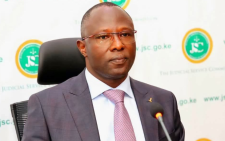Chief executives foresee recession but untroubled

The global recession anticipated in 2023 could compel almost half of East African businesses to trim their workforce in the next 12 months due to a slump in earnings.
Recession risks have impacted earnings of most businesses by up to 10 per cent in the short term, according to an economic outlook by chief executive officers (CEOs) by advisory and audit firm KPMG.
A recession is a period of temporary economic decline during which trade and industrial activity are reduced, generally identified by a fall in gross domestic product (GDP) in two successive quarters.
To save their working capital and remain sustainable while wading through economic downturns, businesses often slash their workforce. Anticipations for a declines in earnings among 59 per cent of CEOs means that business growth could also be upended due to disruptions, further worsening post-Covid recovery attempts.
CEOs options
“In preparation for the anticipated recession, 25 per cent of East Africa CEOs have frozen hiring and 49 per cent are planning to implement a freeze in the short term. 49 per cent of the CEOs are considering downsizing their employee base in the short term,” KPMG said in its 2022 CEO Economic Outlook report.
However, the report says that only 24 per cent of East Africa CEOs anticipate and have prepared for the recession compared to Global CEOs at 76 per cent.
The 51 CEOs were picked from major organisations in East Africa, excluding State-owned entities. They represent 11 sectors, including banking, manufacturing and telecommunication.
Says the report: “59 per cent of East Africa CEO are placing more capital investments in buying new technology”.
Last month, the International Monetary Fund (IMF) projected that the global economic growth will recede to 2.7 per cent in 2023, from 2022’s 3.2 per cent, if the Ukraine war and “other economic shocks” persist in the short term.
The looming slow down in hiring among East Africans mirrors the recent spate of layoffs witnessed among multinationals like Twitter, Google, BBC, Microsoft, Netflix, and Meta among others.
Central Bank of Kenya (CBK) governor Dr Patrick Njoroge in September raised concern that measures the US Federal Reserve meant to rein in inflation may push the global economy into recession, especially among the emerging economies who will have to handle great spillovers.
Benson Ndung’u, Senior Partner and CEO said: “Despite this, it is positive to see that our East Africa CEOs are optimistic about the growth prospects of their countries, industries, and companies. They are taking some short-term steps in various areas of their strategies to build resilience in response to geopolitics and the anticipated recession”.
In Kenya, the reduction in workforce by the private sector players is set to collide with the government’s looming austerity measures and stringent restrictions on hiring among civil servants.
Hospitality sector is for instance staring at another hard patch after the government ordered immediate stop of hospitality supplies and services such as travel.
It will be a cause of concern for both prospective and current employees at a time when the Kenyan job market has been struggling to absorb new graduates for years now.
Kenya National Bureau of Statistics (KNBS) data shows that about 36 per cent or 10.1 million of the country’s 28 million population of Kenya’s workforce are jobless amid poor economic growth.
Kenya’s current jobs are mostly low-paying, informal and growing at a slow pace despite a rise in the cost of living which hit 9.2 percent in September.
The number of Kenyans depending on those with a stable source of income is therefore expected to rise on the back of slumped employment rate and rising inflation caused by external shocks.
In the light of anticipated recession and the current geopolitics tensions, East Africa CEOs are balancing the need to build resilient and transparent Environmental, social, and governance (ESG) plans. This is with the possibility of having to pause or reconsider their approaches in the short-term.
“East Africa CEOs are taking a more proactive approach to societal issues, such as increased investment in a living wage, human rights and just transitions,” notes the survey.
As part of chanting a working growth plan for the next three years, KPMG says that capital allocation, partnerships, alliances, and Merger and Acquisitions (M&A) strategy will have the greatest impact. This is followed by building strong customer relationships.












